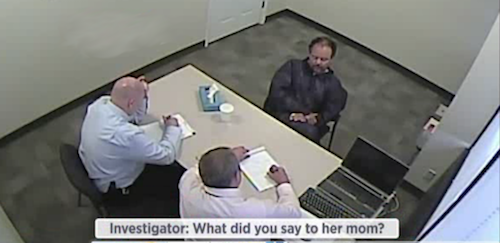Apparently, this ban had been in place for over a century and was over-turned “in the interest of transparency.” Here’s the FBI quote on why it stuck around so long (’twas a badge of honor):
Phil Mudd served as the FBI’s senior intelligence officer after the Sept. 11, 2001 terror attacks.
He said FBI agents have been “accustomed to getting on the stand, in a proud organization, to say ‘look, I was the one who did the interrogation. I can confirm and I’ll swear to confirming what this defendant said to me.'”
Here’s how The New Yorker explained it:
For decades, criminal investigators have known that the best way to obtain and preserve reliable information is to electronically record interviews and interrogations. And yet agents of the Federal Bureau of Investigation have continued to rely on handwritten notes taken during interrogations, which they later type onto so-called 302 forms. In an era of ubiquitous iPhones, the nation’s most advanced law-enforcement agency has been using a technology that, in the words of one official, “dates from the time of Hammurabi.”
If you ever want a good “government moves really slowly” story for a cocktail party with friends, this one might take the cake. It should be noted that it was possible for FBI agents to be in recorded interrogations — if you search YouTube, you’ll find a few, such as this one:
State/local have been doing interrogations for decades (Alaska was the first, in 1985), and sometimes an FBI agent will sit with a local authority (that’s what happened in the interrogation above, which took place in Utah). Also interesting: on any state with a large Indian reservation, the tribal police would handle misdemeanors (and they can record interrogations) and the federal police would handle rapes, murders, and the really heinous stuff (they cannot). Defense attorneys had a field day with this in different trials, and often got cases pleaded down because of the refusal to tape. Check out this story, for example, which helped turn the tide a bit:
In May of 2011, a man sneaked into the home of Travis DuBois, on the Spirit Lake Reservation, in North Dakota, and killed his two children: Travis DuBois, Jr., who was six years old, and Destiny Shaw, who was nine and whom he also sexually assaulted. The father was supposed to be babysitting but he was somewhere else, blackout drunk. Wracked with guilt, he confessed to the crimes after a seven-hour interrogation led by the F.B.I. (Federal agents got permission to record from their regional offices, in Minnesota.) When the Assistant U.S. Attorneys in Fargo watched the interrogation, they felt that something wasn’t right. So, instead of immediately pushing for conviction, they leaned on the forensics team to search thoroughly for evidence. Months later, a DNA analysis of skin under Destiny Shaw’s fingernails and a bloody palm print at the scene of the crime proved not to match her father. Agents took voluntary DNA samples from local residents, which eventually led to a man named Valentino Bagola. Fourteen months after DuBois’s interrogation, Bagola was questioned and also confessed. At the trial, last September, the prosecutors, in addition to presenting forensic evidence, played both interrogations in full. The jury didn’t believe the father’s confession, and convicted Bagola of felony murder. (He is now appealing that conviction.) “Thank God we had both of those recordings and not just forms or reports,” Timothy Q. Purdon, North Dakota’s U.S. Attorney, said.
Some estimate this new policy could save “hundreds of millions” in wrongful convictions, because with video, you can pretty much know exactly what was said — and what the FBI officers did (no funny business!) — so things are a bit more clear-cut. And yes, you can argue that this tide turned in part because of the “CSI effect,” whereby jurors think they should see everything and have forensics on everything, because that’s how it seems to work on the TV shows. Well, now in FBI-tied cases, they will.
